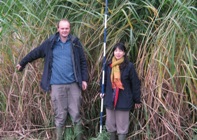Groundbreaking agreement with Seoul National University

Miscanthus hybrids such as these growing in Aberystwyth, Wales UK are expected to play an increasing role in providing renewable energy. Dr John Clifton-Brown (L) and Dr Lin Huang, have collected wild Miscanthus in South Korea to increase biomass yield and quality for use in UK, EU and US.
22 October 2013
Aberystwyth University signs agreements with Seoul National University to share miscanthus germplasm, based on principles of the UN Convention on Biological Diversity to help boost bioenergy production and combat climate change.
East Asian indigenous genetic resources of miscanthus are useful for improving existing miscanthus bioenergy crops elsewhere in the world. Miscanthus may be used to create higher energy yields on lower grade lands which are less suitable for food production.
European energy policy makers recognise the importance of bioenergy crops in the future mix of renewables, and national policies are being developed to encourage their commercial deployment.
The agreement between Aberystwyth University and Seoul National University to share miscanthus germplasm, will support improvements in miscanthus breeding, and respond to national policies on the development of renewable energy.
The Institute of Biological, Environmental and Rural Sciences (IBERS) at Aberystwyth University is one of the first research institutions in the UK to implement international agreements on ‘Access and Benefit Sharing’ for crop breeding, in the spirit of the Convention on Biological Diversity.
On 29 October 2013, Professor John Grattan, Pro Vice-Chancellor at Aberystwyth University, will be accompanied by scientists Dr John Clifton-Brown and Dr Lin Huang from IBERS, and Professor Gary Rawnsley from the Department of International Politics, to the Republic of Korea (South Korea), to sign a bilateral ‘Access and Benefit Sharing’ agreement (mutually agreed terms) with the Seoul National University, where Associate Professor Do-Soon Kim at Department of Plant Science leads Miscanthus research in South Korea.
The signing of this agreement follows the signing of a similar agreement between Aberystwyth University and the Endemic Species Research Institute funded by the Council of Agriculture in Taiwan, in June 2012.
The UN policy on global conservation of biodiversity is embedded in the Convention on Biological Diversity which seeks to protect the sovereignty and sustainability of natural genetic resources, whilst encouraging countries to share their resources for research and commercial purposes.
The subsequent 2010 Nagoya UN protocol, signed by more that 170 countries, is expected to come into force in 2014. It makes further provision for access to genetic resources, and the fair and equitable sharing of the benefits of research and commercialisation with the donor country.
By means of establishing bi-lateral agreements, countries can commit to sharing the benefits of natural resources, technologies, research data, and commercialisation. Aberystwyth University has successfully reached such ‘Access and Benefit Sharing’ agreements with Taiwan and South Korea.
Following the signing ceremony for the agreement with the Republic of Korea, Professor Grattan will deliver a public lecture at the Seoul National University on the ‘Volcanic modification of global climate trends.’
Speaking ahead of the visit, Professor Grattan said; “The signing of these international agreements is a tremendous achievement. It is testimony to the world-wide research credibility of scientists in IBERS, and recognises our contribution to global conservation. Aberystwyth University is proud to have set a precedent on the ethical use of natural resources.”
Of particular importance to scientists at IBERS is the development of international agreements to secure access to miscanthus plants collected in other countries, and to protect the ethical and sustainable use of the plants in scientific research and commerce.
Through a series of plant breeding programmes at IBERS, scientists are realising the full potential of miscanthus as a sustainable bioenergy crop. The most successful bioenergy crops offer a high ‘biomass’ output in exchange for low nutrient and water inputs.
Dr John Clifton-Brown, research scientist at IBERS said; “The Convention on Biological Diversity was formulated to protect natural resources in the context of their national origins. However, many countries do not have legislative or operational procedures in place to implement the convention. IBERS scientists have therefore taken the lead in initiating high-level diplomatic discussions with government agencies around the world, to support the mobility of miscanthus germplasm, and ensure that the benefits of research are shared with the miscanthus source countries.”
Associate Professor Do-Soon Kim also added; “This Access and Benefit Sharing Agreement is the first case of binational plant germplasm exchange based on principles of the UN Convention on Biological Diversity in South Korea and a milestone of Miscanthus research as a bioenergy crop in South Korea.”



